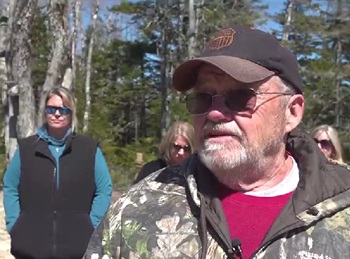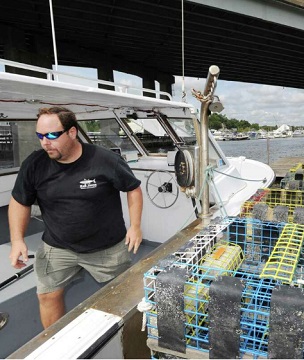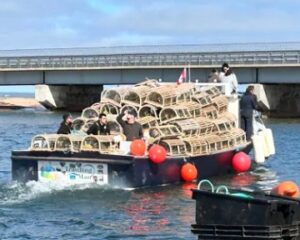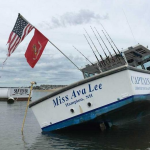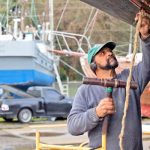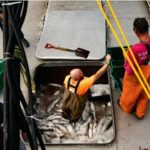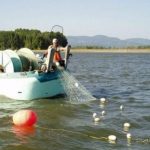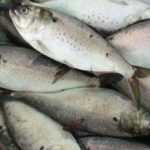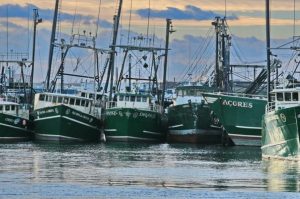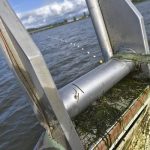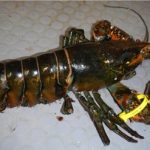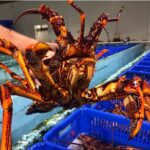Tag Archives: lobstermen
Inside Canada’s lobster wars
 Nighttime provides ideal cover for acts of sabotage in the sleepy fishing villages along the southern shores of Nova Scotia. Slashed buoys, stolen lobster crates, mysterious fires. These are just some of the acts of vandalism on the wharves where lobster fishers have been locked in battle for more than three decades. Lobstermen have a simple way of framing the dispute: think of the ocean’s bounty like a pie. They are asking who should get a piece, and what is the fairest way to divide it between the white Canadians who built the commercial lobster industry and the indigenous people who were historically left out. The Canadian government, which regulates fisheries, has been reluctant to settle the politically fraught issue, alienating warring fishers on both sides. Photos, more, >>CLICK TO READ<< 06:29
Nighttime provides ideal cover for acts of sabotage in the sleepy fishing villages along the southern shores of Nova Scotia. Slashed buoys, stolen lobster crates, mysterious fires. These are just some of the acts of vandalism on the wharves where lobster fishers have been locked in battle for more than three decades. Lobstermen have a simple way of framing the dispute: think of the ocean’s bounty like a pie. They are asking who should get a piece, and what is the fairest way to divide it between the white Canadians who built the commercial lobster industry and the indigenous people who were historically left out. The Canadian government, which regulates fisheries, has been reluctant to settle the politically fraught issue, alienating warring fishers on both sides. Photos, more, >>CLICK TO READ<< 06:29
Stricter lobster fishing rules scrapped after complaints from fishermen about harm to industry
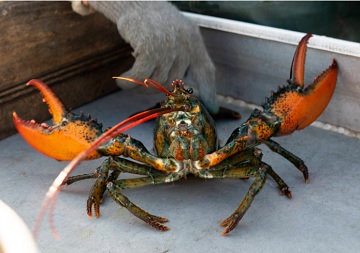 Fishing industry regulators have decided to scrap stricter new lobster fishing standards off New England in the wake of months of protest from lobster fishermen that the rules were unnecessary and would bankrupt harvesters. The regulators were planning to institute new rules this summer that increased the minimum legal harvest size for lobsters in some of the most important fishing grounds in the world. The Atlantic States Marine Fisheries Council, which manages the fishery, said the changes were important to preserve the future of a lobster population that has shown recent signs of decline. Many commercial fishermen adamantly opposed the changes, which would have required them to throw back previously market-ready lobsters. Links, more, >>CLICK TO READ<< 12:39
Fishing industry regulators have decided to scrap stricter new lobster fishing standards off New England in the wake of months of protest from lobster fishermen that the rules were unnecessary and would bankrupt harvesters. The regulators were planning to institute new rules this summer that increased the minimum legal harvest size for lobsters in some of the most important fishing grounds in the world. The Atlantic States Marine Fisheries Council, which manages the fishery, said the changes were important to preserve the future of a lobster population that has shown recent signs of decline. Many commercial fishermen adamantly opposed the changes, which would have required them to throw back previously market-ready lobsters. Links, more, >>CLICK TO READ<< 12:39

Maine and NH lobstermen celebrate reversal of lobster catch size limits
The Atlantic States Marine Fisheries Commission have walked back new regulations that New Hampshire and Maine lobstermen said would have dire economic consequences to their industry. The commission voted Tuesday to repeal key elements of a proposed increase to minimum allowable catch sizes for Gulf of Maine lobster. The announcement comes after officials in Maine and New Hampshire, which together account for most of U.S. lobster landings, announced they would not cooperate with the proposal. “New England Fishermen’s Stewardship Association (NEFSA) thanks the commission for heeding the voice of lobstermen,” said NEFSA COO and fourth-generation lobsterman Dustin Delano. “Raising catch sizes at this time would bankrupt many lobstermen and surrender the U.S. market to foreign competitors. NEFSA is grateful that the commission has chosen to support our historic trade, which contributes billions to New England’s economy and shapes the character of the region.” links, more, >>CLICK TO READ<< 20:11
Researchers to monitor socioeconomic resilience of Maine’s lobster fishery
 A University of Maine-led research team has developed new indicators to measure the socioeconomic resilience of Maine’s lobster fishery. The study aims to deepen understanding of the industry’s challenges and guide future policies supporting the fishery and the communities it sustains. Maine’s lobster fishery, supporting thousands of jobs, is closely monitored and managed through biological surveys and industry reports. However, these statistics don’t capture the full impact of supply disruptions, market shifts and geopolitical tensions on the industry and its communities. With commercial lobster landings dropping 27 percent between 2016 and 2022, the Maine Lobstermen’s Association began exploring new ways to measure the fishery’s socioeconomic resilience, helping leaders better respond to the industry’s challenges. more, >>CLICK TO READ<< 05:53
A University of Maine-led research team has developed new indicators to measure the socioeconomic resilience of Maine’s lobster fishery. The study aims to deepen understanding of the industry’s challenges and guide future policies supporting the fishery and the communities it sustains. Maine’s lobster fishery, supporting thousands of jobs, is closely monitored and managed through biological surveys and industry reports. However, these statistics don’t capture the full impact of supply disruptions, market shifts and geopolitical tensions on the industry and its communities. With commercial lobster landings dropping 27 percent between 2016 and 2022, the Maine Lobstermen’s Association began exploring new ways to measure the fishery’s socioeconomic resilience, helping leaders better respond to the industry’s challenges. more, >>CLICK TO READ<< 05:53
And they’re off! The 2024-25 lobster season in southwestern Nova Scotia opens with Dumping Day
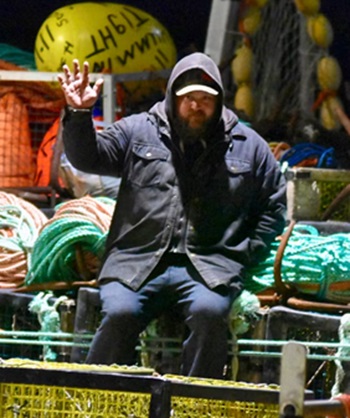 Following a one-day weather delay, the six-month commercial lobster fishery in southwestern Nova Scotia and along the province’s south shore opened on the morning of Nov. 26 with light winds to send off the crews. Referred to as Dumping Day, here are some photos from parts of Yarmouth County as boats left their wharfs and harbours in LFA 34 to head to the fishing grounds. The season started at 5 a.m., which is an hour earlier than normal, to capitalize on the lighter winds. Lots of photos, more, >>CLICK TO READ<< 08:06
Following a one-day weather delay, the six-month commercial lobster fishery in southwestern Nova Scotia and along the province’s south shore opened on the morning of Nov. 26 with light winds to send off the crews. Referred to as Dumping Day, here are some photos from parts of Yarmouth County as boats left their wharfs and harbours in LFA 34 to head to the fishing grounds. The season started at 5 a.m., which is an hour earlier than normal, to capitalize on the lighter winds. Lots of photos, more, >>CLICK TO READ<< 08:06
Newfoundland and Labrador recorded its highest lobster landings ever this past season
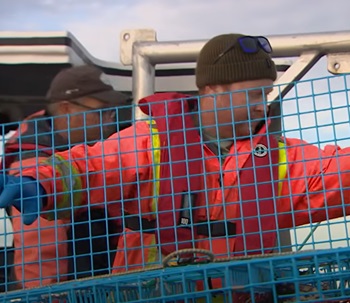 And so, this past spring, when I was hearing so much about the abundance of lobsters in our waters, I wanted to find out what was going on. I called around to several harvesters in various parts of the province to find out about their catch rates. The thing is, when lobsters are plentiful, lobster fishermen can be a tight-lipped bunch. I knew after a few phone calls, it would be hard to get anyone to go on camera for a Land & Sea show to brag about their bounty. And that was confirmed for me by Fortune Bay fisherman Alfred Fitzpatrick, who fishes out of Garnish on the Burin Peninsula. “Fellows will tell you they poached a moose before they tell you they caught a lobster. If you hauled 200 pots and you got 10 lobsters, and your brother asked you, you’d say, ‘Boy, I got five,'” explained Fitzpatrick. Video, more, >>CLICK TO READ<< 08:14
And so, this past spring, when I was hearing so much about the abundance of lobsters in our waters, I wanted to find out what was going on. I called around to several harvesters in various parts of the province to find out about their catch rates. The thing is, when lobsters are plentiful, lobster fishermen can be a tight-lipped bunch. I knew after a few phone calls, it would be hard to get anyone to go on camera for a Land & Sea show to brag about their bounty. And that was confirmed for me by Fortune Bay fisherman Alfred Fitzpatrick, who fishes out of Garnish on the Burin Peninsula. “Fellows will tell you they poached a moose before they tell you they caught a lobster. If you hauled 200 pots and you got 10 lobsters, and your brother asked you, you’d say, ‘Boy, I got five,'” explained Fitzpatrick. Video, more, >>CLICK TO READ<< 08:14
Maine: Judge dismisses case against the state challenging lobster boat tracking rules
![]() A federal judge has ruled against a group of five lobstermen that sued the state in attempt to stop electronic boat tracking requirements that went effect almost one year ago. The rules require lobstermen with federal fishing permits to install monitors on their boats that track their location on the water. The fishermen argued that they should not be subject to monitoring at all times. They often use their boats for other purposes beyond commercial lobstering, which Woodcock acknowledged. The boat tracking requirements will stay in place for now. But in his decision, Woodcock said the lobstermen had raised important Fourth Amendment questions and encouraged them to appeal the case. more, >>CLICK TO READ<< 11:21
A federal judge has ruled against a group of five lobstermen that sued the state in attempt to stop electronic boat tracking requirements that went effect almost one year ago. The rules require lobstermen with federal fishing permits to install monitors on their boats that track their location on the water. The fishermen argued that they should not be subject to monitoring at all times. They often use their boats for other purposes beyond commercial lobstering, which Woodcock acknowledged. The boat tracking requirements will stay in place for now. But in his decision, Woodcock said the lobstermen had raised important Fourth Amendment questions and encouraged them to appeal the case. more, >>CLICK TO READ<< 11:21
Invasive blob-like creatures are clogging Maine fishing gear – “They’re a pain in the ass.”
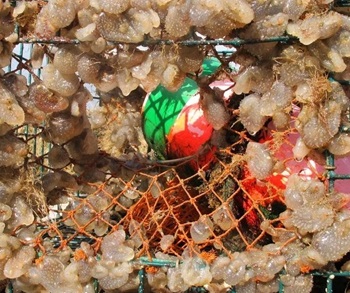 The small invertebrates, several species of which are invasive, are attaching themselves in large numbers to lobster traps and aquaculture equipment, at times creating a major hassle for harvesters as they try to tend to their gear. “The month of September, they come on like gangbusters,” Hilton Turner, a lobsterman and chair of Stonington’s harbor committee, said about the tunicates, which are better known as sea squirts. “Every year gets a little worse,” he said. Lobstermen use different techniques to try to remove the squirts. Some set the traps in boiling hot water tanks on their boats, some try immersing them in salt-saturated water, and still others blast them with a power washer, which can be time-consuming, Turner said. more, >>CLICK TO READ<< 08:25
The small invertebrates, several species of which are invasive, are attaching themselves in large numbers to lobster traps and aquaculture equipment, at times creating a major hassle for harvesters as they try to tend to their gear. “The month of September, they come on like gangbusters,” Hilton Turner, a lobsterman and chair of Stonington’s harbor committee, said about the tunicates, which are better known as sea squirts. “Every year gets a little worse,” he said. Lobstermen use different techniques to try to remove the squirts. Some set the traps in boiling hot water tanks on their boats, some try immersing them in salt-saturated water, and still others blast them with a power washer, which can be time-consuming, Turner said. more, >>CLICK TO READ<< 08:25
Lobstermen and Scientists See a Fishery in Flux
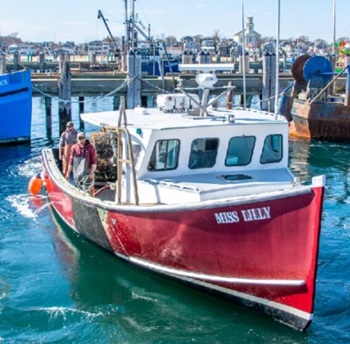 While overall the fishery seems stable, some lobstermen are seeing changes that have them worried about its future. Scientists are looking into what role the changing climate may be playing in those changes, but they don’t have definitive answers. “It’s horrible,” said Mike Rego, a lobsterman and owner of the F/V Miss Lilly who operates out of Provincetown. “Last year was the worst year I ever had.” Dana Pazolt, another Provincetown lobsterman who owns the F/V Black Sheep, said that the last four years have been slim for lobsters around the Outer Cape. “You’ve got to hunt for them,” he said. “I can’t tell you why that is.” The surface waters of the Gulf of Maine are warming at a rate of about one degree per decade, faster than 99 percent of the world’s oceans, according to the Gulf of Maine Research Institute. Meanwhile, in other areas, warming has already had an effect — it played a major role in causing the collapse of the lobster fishery in Long Island Sound in 1999. more, >>CICK TO READ<< 21:20
While overall the fishery seems stable, some lobstermen are seeing changes that have them worried about its future. Scientists are looking into what role the changing climate may be playing in those changes, but they don’t have definitive answers. “It’s horrible,” said Mike Rego, a lobsterman and owner of the F/V Miss Lilly who operates out of Provincetown. “Last year was the worst year I ever had.” Dana Pazolt, another Provincetown lobsterman who owns the F/V Black Sheep, said that the last four years have been slim for lobsters around the Outer Cape. “You’ve got to hunt for them,” he said. “I can’t tell you why that is.” The surface waters of the Gulf of Maine are warming at a rate of about one degree per decade, faster than 99 percent of the world’s oceans, according to the Gulf of Maine Research Institute. Meanwhile, in other areas, warming has already had an effect — it played a major role in causing the collapse of the lobster fishery in Long Island Sound in 1999. more, >>CICK TO READ<< 21:20
‘To honor the lobstermen,’ Bailey Island artist paints their portraits
 “I love Maine. Lobstering’s part of Maine. Lobstering’s threatened. And I just want to honor the lobstermen.” So said Bailey Island artist Dennis Wilkins, who often walks the quarter mile from his home on Abner Point to Glen’s Lobsters, the place where he buys his “critters.” It was there he conceived of the project that he hopes will raise awareness of the ongoing challenges facing the lobster industry. “They’re under multiple stresses — climate change, regulations … It’s like the world’s coming down on them,” Wilkins said. “I want them to see that they’re recognized … they’re appreciated, so much so that I’m going to spend time to paint their portraits and give them to them.” Wilkins, a retired neurologist and self-trained fine artist, started working on the project in June 2023. Portraits, more, >>CLICK TO READ<< 15:46
“I love Maine. Lobstering’s part of Maine. Lobstering’s threatened. And I just want to honor the lobstermen.” So said Bailey Island artist Dennis Wilkins, who often walks the quarter mile from his home on Abner Point to Glen’s Lobsters, the place where he buys his “critters.” It was there he conceived of the project that he hopes will raise awareness of the ongoing challenges facing the lobster industry. “They’re under multiple stresses — climate change, regulations … It’s like the world’s coming down on them,” Wilkins said. “I want them to see that they’re recognized … they’re appreciated, so much so that I’m going to spend time to paint their portraits and give them to them.” Wilkins, a retired neurologist and self-trained fine artist, started working on the project in June 2023. Portraits, more, >>CLICK TO READ<< 15:46
Maine’s wharf owners scramble to repair what they can before lobstering season starts
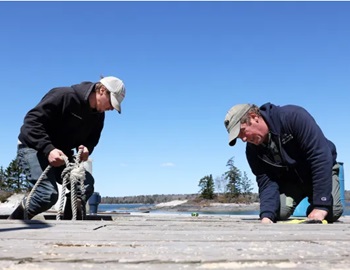 Contractors are hard to come by amid the mounting demand for work to repair damage from the set of January storms that battered the coast of Maine. Now, as lobstering season begins, many on the working waterfront are patching their own wharves, hoping they can hold out until the real work can be done. Chris Hole was busy at work on a sunny Friday morning, taking apart his commercial fishing wharf like a game of Jenga. After pulling up the surface wooden slats, Hole used a fork lift to lower large wooden beams down to the deck. Josh Saxton, Hole’s right-hand man, would then slip between the large gaps in the deck to put the support beams in place. Photos, more, >>CLICK TO READ<< 06:43
Contractors are hard to come by amid the mounting demand for work to repair damage from the set of January storms that battered the coast of Maine. Now, as lobstering season begins, many on the working waterfront are patching their own wharves, hoping they can hold out until the real work can be done. Chris Hole was busy at work on a sunny Friday morning, taking apart his commercial fishing wharf like a game of Jenga. After pulling up the surface wooden slats, Hole used a fork lift to lower large wooden beams down to the deck. Josh Saxton, Hole’s right-hand man, would then slip between the large gaps in the deck to put the support beams in place. Photos, more, >>CLICK TO READ<< 06:43
Warming Waters Heat Summer’s Feast Well Before It Gets to the Kitchen
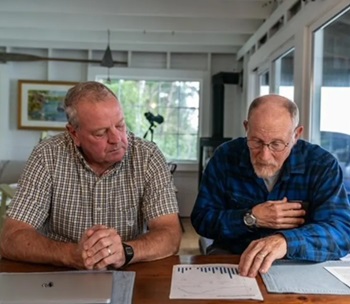 An ever-warming planet is playing havoc with the intricately interconnected web of marine life. Just as climate has long stressed human populations and driven migration, marine populations are stressed and in search of survivable climates too. In New England, scientists and lobstermen alike are studying and living the impacts. Tim Alley has been lobstering in Maine’s coastal waters for 40 years. “There’s been a trend in recent years related to temperatures,” he says. Alley is steeped in the traditions of his home state’s biggest industry and recently dusted off a short film from 1972 in which he starred at age 12, “Alone in My Lobster Boat,” filmed in South Bristol and New Harbor, Maine. Like most lobstermen, he would call himself an environmentalist: they live on the water, they live from the water, they thrive on the water. But they reject the notion that a species – the right whale – is failing because of them. Over 40 years, he says, he has seen exactly one right whale. Photos, Video, more, >>CLICK TO READ<< 14:50
An ever-warming planet is playing havoc with the intricately interconnected web of marine life. Just as climate has long stressed human populations and driven migration, marine populations are stressed and in search of survivable climates too. In New England, scientists and lobstermen alike are studying and living the impacts. Tim Alley has been lobstering in Maine’s coastal waters for 40 years. “There’s been a trend in recent years related to temperatures,” he says. Alley is steeped in the traditions of his home state’s biggest industry and recently dusted off a short film from 1972 in which he starred at age 12, “Alone in My Lobster Boat,” filmed in South Bristol and New Harbor, Maine. Like most lobstermen, he would call himself an environmentalist: they live on the water, they live from the water, they thrive on the water. But they reject the notion that a species – the right whale – is failing because of them. Over 40 years, he says, he has seen exactly one right whale. Photos, Video, more, >>CLICK TO READ<< 14:50
P.E.I. harbours face challenges with approach of lobster season
 The spring lobster season on Prince Edward Island is just a few weeks away, but some harbours are facing challenges as Island fishermen prepare to head out and set their traps. At Malpeque Harbour, windy weather has slowed down efforts to clear the winding channel that they will take on setting day. “They’ve had a real hard time this year due to weather,” said fisherman Timothy Wall, who has been fishing for 30 years, following the occupation of his father and grandfather. “They’ve been on the site for two weeks already, and they can’t even get to the outside of the harbour, just the weather hasn’t been fit. Moving the harbour deeper into Malpeque Bay, where there is less moving sand, could be an option, said Wall, but there are no certain answers. Video, photos, more, >>click to read<< 11:12
The spring lobster season on Prince Edward Island is just a few weeks away, but some harbours are facing challenges as Island fishermen prepare to head out and set their traps. At Malpeque Harbour, windy weather has slowed down efforts to clear the winding channel that they will take on setting day. “They’ve had a real hard time this year due to weather,” said fisherman Timothy Wall, who has been fishing for 30 years, following the occupation of his father and grandfather. “They’ve been on the site for two weeks already, and they can’t even get to the outside of the harbour, just the weather hasn’t been fit. Moving the harbour deeper into Malpeque Bay, where there is less moving sand, could be an option, said Wall, but there are no certain answers. Video, photos, more, >>click to read<< 11:12
Maine lobstermen struggle to adapt to new electronic reporting rules. Their licenses are on the line.
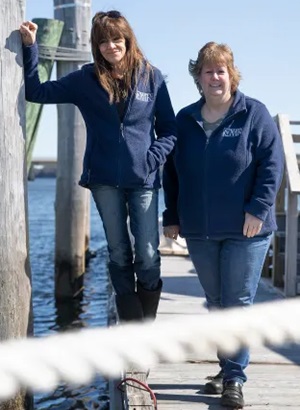 Alice Mayberry and Sue Kelley spend most of their days talking to lobstermen about what they’ve hauled in. Mayberry is riffling through paper logs. Kelley is texting until 9 p.m. Then, they both log onto the Maine Department of Marine Resources’ database and plug in what the lobstermen did for the day. Over the last several years, state and federal regulators started requiring more fishermen to report what they caught, and where. A few years ago, only a portion of harvesters needed to submit that information, and it could be sent in on a piece of paper. Now, all fishermen who harvest 15 species of fish – pogies, scallops, lobster, halibut, mussels, eels and others – have to file their landings electronically. Fishermen in Maine are gradually learning what they’re supposed to do. For lobstermen, adjusting has been particularly hard. Audio, more, >>click to read<< 15:58
Alice Mayberry and Sue Kelley spend most of their days talking to lobstermen about what they’ve hauled in. Mayberry is riffling through paper logs. Kelley is texting until 9 p.m. Then, they both log onto the Maine Department of Marine Resources’ database and plug in what the lobstermen did for the day. Over the last several years, state and federal regulators started requiring more fishermen to report what they caught, and where. A few years ago, only a portion of harvesters needed to submit that information, and it could be sent in on a piece of paper. Now, all fishermen who harvest 15 species of fish – pogies, scallops, lobster, halibut, mussels, eels and others – have to file their landings electronically. Fishermen in Maine are gradually learning what they’re supposed to do. For lobstermen, adjusting has been particularly hard. Audio, more, >>click to read<< 15:58
Floating offshore wind experts say they want to coexist with Maine lobstermen, but lobstermen say no thanks
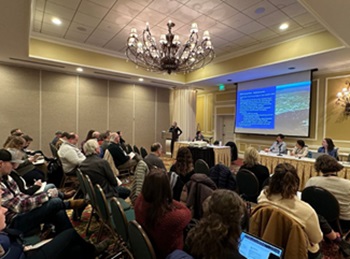 Lobstermen asked pointed questions Thursday about a planned offshore floating wind array that they fear will take away fishing grounds and potentially disrupt the species they rely on to make a living. “Offshore wind overall we have a lot of issues with,” Virginia Olsen, political director of the Maine Lobstering Union said. “We know it will be industrializing our ocean and as fishermen we just don’t want to see that happen.” During the Thursday presentation, state officials and consultants working on the floating array emphasized they want to work toward “coexistence” between the new technology and the fishing industry. But that didn’t sit well with some of the lobstermen, who said they don’t want to co-exist with the turbines. more, >>click to read<< 06:50
Lobstermen asked pointed questions Thursday about a planned offshore floating wind array that they fear will take away fishing grounds and potentially disrupt the species they rely on to make a living. “Offshore wind overall we have a lot of issues with,” Virginia Olsen, political director of the Maine Lobstering Union said. “We know it will be industrializing our ocean and as fishermen we just don’t want to see that happen.” During the Thursday presentation, state officials and consultants working on the floating array emphasized they want to work toward “coexistence” between the new technology and the fishing industry. But that didn’t sit well with some of the lobstermen, who said they don’t want to co-exist with the turbines. more, >>click to read<< 06:50
Data show fewer baby lobsters but fishermen say ‘eggers’ abound
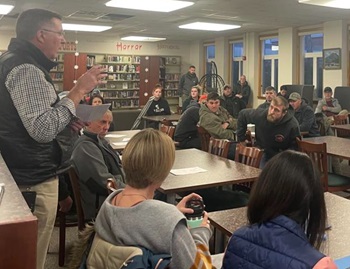 Lobstermen and the agency that oversees them, the Maine Department of Marine Resources (DMR), sparred a little over state data on lobster populations that lobstermen said does not reflect what they see when fishing, when the Zone B Lobster Council met Feb. 21 at the Mount Desert Island High School library. The DMR estimates the number of baby lobsters, called “year of young,” through trawl and ventless trap surveys to project future adult populations and manage the fishery — and to adhere to interstate fishery rules from the Atlantic States Marine Fisheries Commission (ASMFC), an interstate board managing fisheries for 15 states, including Maine. 3 Photos, more, >>click to read<< 12:45
Lobstermen and the agency that oversees them, the Maine Department of Marine Resources (DMR), sparred a little over state data on lobster populations that lobstermen said does not reflect what they see when fishing, when the Zone B Lobster Council met Feb. 21 at the Mount Desert Island High School library. The DMR estimates the number of baby lobsters, called “year of young,” through trawl and ventless trap surveys to project future adult populations and manage the fishery — and to adhere to interstate fishery rules from the Atlantic States Marine Fisheries Commission (ASMFC), an interstate board managing fisheries for 15 states, including Maine. 3 Photos, more, >>click to read<< 12:45
Maine lobstermen save missing man’s life, officials say
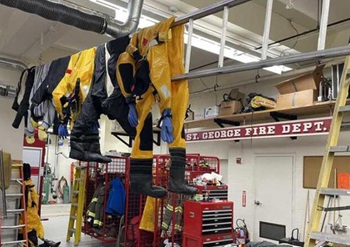 A man was rescued by a local lobsterman off the coast of St. George Sunday evening in a case that fire officials say highlights the importance of telling people what your plans are and when you plan to return. St. George Fire and Rescue were called just before 5 p.m. Sunday to look for a man who had missed a check-in with his family while he was bringing in a skiff. While first responders were figuring out where to begin their search between Tenants Harbor and Rackliff Island, someone heard a person yelling from a nearby island and called it in. More, >>click to read<< 18:45
A man was rescued by a local lobsterman off the coast of St. George Sunday evening in a case that fire officials say highlights the importance of telling people what your plans are and when you plan to return. St. George Fire and Rescue were called just before 5 p.m. Sunday to look for a man who had missed a check-in with his family while he was bringing in a skiff. While first responders were figuring out where to begin their search between Tenants Harbor and Rackliff Island, someone heard a person yelling from a nearby island and called it in. More, >>click to read<< 18:45
Maine lobstermen sue to stop new electronic tracking
 Maine lobstermen are suing to stop a new suing to stop they argue violates their constitutional rights. In a lawsuit filed in U.S. District Court for the District of Maine, the five lobstermen, who are being supported by the Sustainable Maine Fishing Foundation, the nonprofit arm of the Maine Lobstering Union, argue the rules present an “immediate and serious risk” to their constitutional right to privacy. The lobstermen are being represented by the Portland law firm of McCloskey, Mina, Cunniff & Frawley LLC. The new rules, which the Maine Department of Marine Resources began implementing on Dec. 15, 2023, require lobstermen with federal permits to install electronic trackers that monitor the movement of their boats 24/7. more, >>click to read<< 13:42
Maine lobstermen are suing to stop a new suing to stop they argue violates their constitutional rights. In a lawsuit filed in U.S. District Court for the District of Maine, the five lobstermen, who are being supported by the Sustainable Maine Fishing Foundation, the nonprofit arm of the Maine Lobstering Union, argue the rules present an “immediate and serious risk” to their constitutional right to privacy. The lobstermen are being represented by the Portland law firm of McCloskey, Mina, Cunniff & Frawley LLC. The new rules, which the Maine Department of Marine Resources began implementing on Dec. 15, 2023, require lobstermen with federal permits to install electronic trackers that monitor the movement of their boats 24/7. more, >>click to read<< 13:42
Interview: Massachusetts lobstermen want to invent a better lobster trap
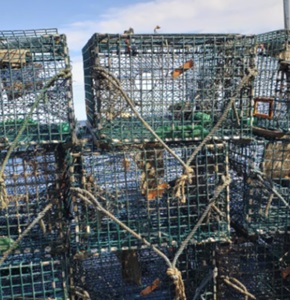 For years, right whale advocates and engineers have been trying to develop new lobster fishing gear designed to prevent whales from entanglements. But most local lobstermen say they’re against this so-called “on demand” fishing gear that’s been created. Now, as CAI’s Eve Zuckoff reports, lobstermen have decided to come up with their own technology. Eve, you were the first to report this, thanks for being here this morning. Eve Zuckoff: Thanks for having me. Patrick Flanary: So the Massachusetts lobstermen’s association has just been awarded a $1.2 million grant to develop new fishing gear. What’s their proposal? more, >>click to read<< 09:47
For years, right whale advocates and engineers have been trying to develop new lobster fishing gear designed to prevent whales from entanglements. But most local lobstermen say they’re against this so-called “on demand” fishing gear that’s been created. Now, as CAI’s Eve Zuckoff reports, lobstermen have decided to come up with their own technology. Eve, you were the first to report this, thanks for being here this morning. Eve Zuckoff: Thanks for having me. Patrick Flanary: So the Massachusetts lobstermen’s association has just been awarded a $1.2 million grant to develop new fishing gear. What’s their proposal? more, >>click to read<< 09:47

CANCELED: Lobstermen pull together for Travis Mills Foundation
Update: Due to the tragic events of this week in Lewiston, this event has been canceled for this year, according to local team organizer Jennie Mitchell. Original Post: On Saturday, Oct. 28 from 10:30 a.m. to 2 p.m. lobstermen from up and down the coast of Maine will be one of the 45 teams pulling a FedEx 757 airplane down the runway at the Portland Jetport to help raise funds for the Travis Mills Foundation. Team Captain Troy Plummer has gotten fishermen from as far away as Machias, Vinalhaven, Friendship, Rockland and, of course, Boothbay Harbor, to participate in what is being billed as a “Pay it Forward” effort from the lobstermen for all the support they have received in their struggle to save the lobstering industry. >>click to read<< 12:05
Delano: Biden administration won’t leave lobstermen alone
 Lawmakers and a federal appeals court last year defeated a federal plan to save endangered whales by eradicating New England’s lobster industry. With those plans undone, the National Oceanic and Atmospheric Administration (NOAA) is crafting a workaround scheme to regulate lobstermen out of the fishery. Recent years have been brutal going for lobstermen, such that the survival of our trade is highly uncertain. Lobstermen are at once negotiating higher fuel costs, higher bait costs, higher shipping costs, and an agitation campaign from dark money nonprofits trained on major buyers of Maine lobster products. NOAA’s new regulatory plan is poised to decimate our inventory. >>click to read<< 09:18
Lawmakers and a federal appeals court last year defeated a federal plan to save endangered whales by eradicating New England’s lobster industry. With those plans undone, the National Oceanic and Atmospheric Administration (NOAA) is crafting a workaround scheme to regulate lobstermen out of the fishery. Recent years have been brutal going for lobstermen, such that the survival of our trade is highly uncertain. Lobstermen are at once negotiating higher fuel costs, higher bait costs, higher shipping costs, and an agitation campaign from dark money nonprofits trained on major buyers of Maine lobster products. NOAA’s new regulatory plan is poised to decimate our inventory. >>click to read<< 09:18
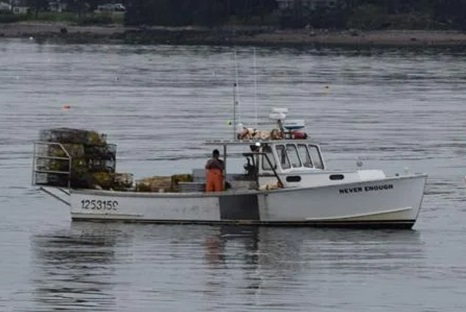
Lobster dealers hope for a fall surge
This year, boat prices are high, but the catch is down, dealers say. Supply is meeting demand, but the demand is lower than last year. While at least one local seafood retailer had a great summer, wholesale dealers’ reports are unenthusiastic. Both lobstermen and dealers are keeping fingers crossed for a big fall surge in catch. With the state’s commercial fishery granted a six-year reprieve in December from new federal regulations that many industry voices said would decimate the fishery, the 2023 season has focused on traditional concerns, such as supply, demand, prices and bait. “The price is up but the catch is down, and we’ve had horrible weather,” said Susan Soper, general manager of Winter Harbor Lobster Co-op. “Our retail sales were almost 60 percent down.”>>click to read<< 13:03
At Mackerel Cove wharf, Arizona-based lobster chain learns as it grows
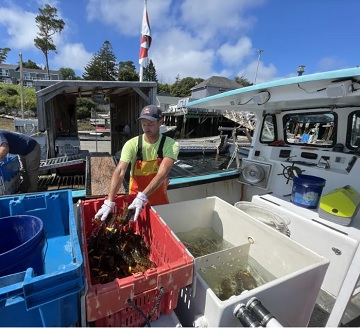 There, an upstart fast food company called Angie’s Lobster offers rolls filled with a quarter-pound of New England’s favorite crustacean that’s served warm and buttered, chilled, grilled or fried. Add in a drink, fries and their trademark sauce and the total comes to — wait for it — $9.99. Is there a catch? Yep, in more ways than one. It all begins with Harpswell lobster boats and a historic wharf nestled into Mackerel Cove on Bailey Island. In the summer of 2022, Angie’s bought a long-standing family lobster pound there and established the first link in a supply chain that is bringing Vacationland lobster to Arizona drive-thru diners at eye-poppingly low prices. Tony Christofellis, who founded the company and named it for his late mother, says business is good and getting better. He says buying the Bailey Island wharf was “the coolest thing we’ve ever done.” Photos, >>click to read<< 08:10
There, an upstart fast food company called Angie’s Lobster offers rolls filled with a quarter-pound of New England’s favorite crustacean that’s served warm and buttered, chilled, grilled or fried. Add in a drink, fries and their trademark sauce and the total comes to — wait for it — $9.99. Is there a catch? Yep, in more ways than one. It all begins with Harpswell lobster boats and a historic wharf nestled into Mackerel Cove on Bailey Island. In the summer of 2022, Angie’s bought a long-standing family lobster pound there and established the first link in a supply chain that is bringing Vacationland lobster to Arizona drive-thru diners at eye-poppingly low prices. Tony Christofellis, who founded the company and named it for his late mother, says business is good and getting better. He says buying the Bailey Island wharf was “the coolest thing we’ve ever done.” Photos, >>click to read<< 08:10
Maine lobstermen credited with saving lives of boaters following yacht fire
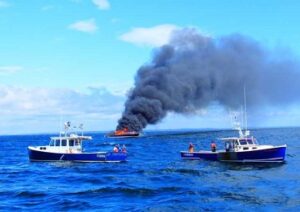 Several lobstermen are credited with saving the lives of two boaters off the coast of Georgetown on Saturday. The 48-foot yacht Titan caught fire several miles off Seguin Island, with flames quickly spreading, prompting the boaters to jump into the water for safety. According to the U.S. Coast Guard Lt. David J. Letarte, the agency issued an Urgent Mariner Information Broadcast after the boaters called for help reporting their vessel was disabled, and fire was coming from the engine room. Letarte was able to identify one of the lobster boats involved in pulling the boaters to safety as “My Three Blondes” but added there were vessels involved in the effort. >click to read< 15:36
Several lobstermen are credited with saving the lives of two boaters off the coast of Georgetown on Saturday. The 48-foot yacht Titan caught fire several miles off Seguin Island, with flames quickly spreading, prompting the boaters to jump into the water for safety. According to the U.S. Coast Guard Lt. David J. Letarte, the agency issued an Urgent Mariner Information Broadcast after the boaters called for help reporting their vessel was disabled, and fire was coming from the engine room. Letarte was able to identify one of the lobster boats involved in pulling the boaters to safety as “My Three Blondes” but added there were vessels involved in the effort. >click to read< 15:36
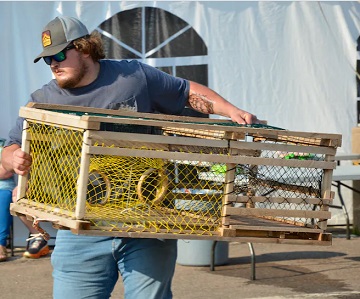
P.E.I. fishermen compete for $1,000 in lobster trap stacking competition in Summerside
Sweat dripped down Ryan Murphy’s face as he caught his breath after winning the Journal Pioneer Lobster Trap Stacking Competition in Summerside on July 6. “The last one, I couldn’t feel my legs there. They were a little bit rubbery,” said Murphy, laughing. Altogether, only four of P.E.I.’s toughest lobster fishermen tested their strength and competed for a grand prize of $1,000. The competition has been part of the Summerside Lobster Carnival at Credit Union Place for a number of years. The fisherman had to move eight lobster traps about nine metres across the fairgrounds on a sweltering summer evening. >click to read< 11:12
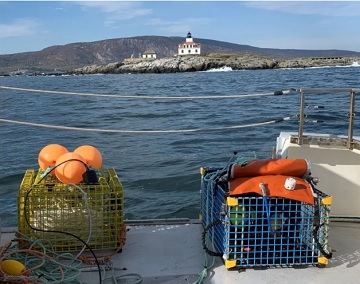
Hope vs. rope: Can technology save the whales, and Maine’s lobster industry, too?
Along the coasts of Massachusetts and Rhode Island, scientists, engineers, and fishermen are working feverishly to develop a new, high-tech way to harvest lobster – and the result could be the key to the survival of both the U.S. lobster fishery and the imperiled North Atlantic right whale. But farther north in Maine, the epicenter of the fishery, it’s unusually quiet. Only one Maine business is working on the technology, and only a handful of Maine lobstermen will test it. Many won’t even discuss it. The ropeless part is being worked out, but another critical component – an interoperable, open platform to track gear – is far from ready. The new equipment also is, at least for now, prohibitively expensive. One lobsterman said it would cost him nearly $500,000 upfront. >click to read< 16:20

Democrats’ Green Agenda Will Gut America’s Oldest Industry And Turn Coastal Towns Into The New Appalachia
Biden’s regulators are driving fishermen of all kinds off the water in droves, while offshore wind development his administration backs is threatening access to productive fishing grounds. Coastal towns keyed to commercial fishing—like Stonington, Maine or Grand Isle, Louisiana—are facing social and economic oblivion. Fishermen are not a powerful political constituency. They do not give lavishly to politicians or command a powerful lobby in Washington. Of late, fishermen in the north Atlantic formed a grassroots organization, the New England Fishermen Stewardship Association (NEFSA), to advocate for jobs, coastal communities, and sustainable management of our oceans. >click to read< 13:35






